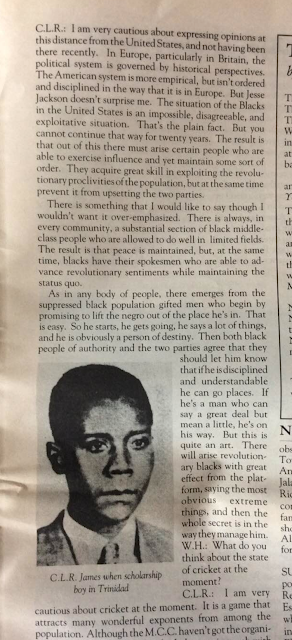As a postscript, I can, like Williams, recall seeing the CLR James BBC documentary. Though it must have been a repeat because I would have put watching the film sometime in the early 1980s. I say that because my first encounter with James occurred a bit before viewing the documentary. I was travelling by train to teach a class in the west of England when I heard a lilting West Indian voice coming from the back of the carriage holding forth on how the ill-fated SDP (which had recently been formed in 1981 by disgruntled rightwing Labour MPs) was destined to fail. Not because of its politics but simply because of the way the House of Commons was constructed. That is, its actual space did not allow for a major third party opposition. I'd never heard anyone talk about the politics of physical space in that manner (though I had yet to read anything so abstract as Bachelard's Poetics of Space, I was reminded at the time of the seemingly endless debate a decade earlier about the shape of the table prior to the peace negotiations at the end of the Vietnam war). I turned and saw a group of young black students surrounding this man who was holding forth. But it was only while watching the aforementioned BBC documentary that I realised that person was, in fact, CLR James.
Wednesday, June 01, 2022
CLR James: Then & Now
Reading John L. Williams' excellent biography of CLR James put me in mind of an interview I was fortunate enough to conduct with James in the Spring of 1989, just a few weeks before his death. The interview appeared in Labour Briefing as well as in Ed & Jenny Dorn's Rolling Stock, accompanied by an account of a memorial for CLR James held some months later (all of which I've inserted below). These days I feel privileged to have been able to meet such a formidable writer and thinker. One of the things I liked about Williams' detailed and scrupulously researched account of James' life is that, with no particular factional axe to grind, the facts of James' life quite rightly stand on their own. And those facts and that life are truly impressive. Likewise the range of those with whom James crossed paths, whether in the world of politics or cricket. And there are, of course, many surprises. While I was aware of the likes of Trotsky, Eric Williams, Kenyatta, and cricket commentator John Arlott, I hadn't known about James' friendship with Ernest Borneman (author the excellent noir novel Face On the Cutting Floor). But, then, James' life really was, as the title states, beyond the boundaries. Suffice it to say that anyone interested in James or, for that matter, black history, colonialism and empire, or simply the function and drift of 20th century politics and culture should do themselves a favour and take a serious look at this book.
Subscribe to:
Post Comments (Atom)





No comments:
Post a Comment